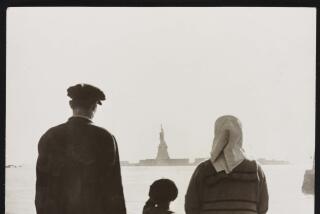Review: PBS’ ‘Cancer’ documentary cuts to the heart of the matter
- Share via
Barak Goodman’s three-part documentary, “Cancer: The Emperor of All Maladies,” is prefaced with the sort of “not suitable for all viewers” warning far more typical of a hard-R cable series than a PBS documentary that’s not about the Holocaust.
And with good reason: Cancer is, of course, its own ongoing holocaust, and Goodman is determined to examine it thoroughly, objectively (which is not to say clinically) and fearlessly. The result is possibly the least live-tweetable six hours of television you will ever see and also among the most important.
Based on Siddhartha Mukherjee’s Pulitzer Prize-winning book of the same name, “Cancer” chronicles humanity’s fight against its most inexorably fatal foe from the time of the ancient Egyptians to current day. The series includes a lot of complicated science and many deaths, including those of children whose treatment is featured.
Though dotted with hope, triumph and the near-miraculous, it does not have a happy ending or an ending at all. While cures or effective treatments are now available for some forms of cancer, the disease continues to claim the lives of millions.
Include in that grim tally narrator Edward Herrmann, who was in the final stages of brain cancer when he taped the narration of “Cancer.” He delivers a final performance, equal in breathtaking courage and beauty, that embodies precisely what allows Goodman to explore the staggering numbers and many defeats without ever falling to its knees as defeatist. Underpinning the entire series is the astonishing human ability to fight to the end even when there seems to be no hope.
The topic alone makes “Cancer” the single most personally relevant documentary of this or any year. As the film points out almost immediately, there are few people who live in more than one degree of separation from the disease.
One in two men and one in three women will be diagnosed with some form during their lifetimes, and those who don’t themselves develop cancer invariably know someone who will. Yet fear still keeps many of us alarmingly ignorant.
Though not the social taboo it once was, cancer remains a topic to be avoided until personal circumstances make that impossible. Many Americans are far more conversant about the ins and outs of various fad diets or the history of the Kardashians than they are about the history and state of cancer research.
This documentary tries to, and should, change all that.
Presented and executive produced by Ken Burns, “Cancer” borrows basic structure and many grace-notes from the Burnsian canon. No famous voices read historical documents, but the music is there, pushing viewers this way and that, as are the screen-holding period photographs.
More important, however, is the signature thoroughness. Current reality plays a far larger role here than in most of Burns’ work, which adds both to depth and level of difficulty.
Deftly crisscrossing real-time cases, historical explanation and expert commentary (some provided by Mukherjee), Goodman approaches his topic with admirable totality. The history reaches back to ancient medical practices and, moving forward, examines social attitudes, political trends and, increasingly, economics.
Each two-hour episode has a specific focus but also takes us through a more general timeline of progress and setback; Goodman uses patients and their families through treatment to balance the intense and fascinating description of the research with the inevitably heart-wrenching realities. The first episode deals with childhood leukemia, and though the overall story is one of great progress — childhood leukemia is now curable in many cases — it is tough to watch, particularly because it involves the real-time treatment of young children.
But the patients, doctors and scientists are not the only personalities involved. Politicians and philanthropists, psychologists and historians play a huge role in the launching and waging of America’s war on cancer and the examination of that war.
President Richard Nixon never looked as good as he does here, stumping for the National Cancer Act of 1971, and much time is devoted to the tireless work of Mary Lasker, a socialite and philanthropist who all but invented health activism, as well as the American Cancer Society. (A clip of her being interviewed by the chain-smoking Edward R. Murrow is particularly affecting; Murrow died at 57 of lung cancer.)
Throughout the series we learn about the little and big things that pushed the research forward. We see the setbacks, the breakthroughs that turned out to be horrific mistakes (the radical mastectomy, extreme chemo) and all the people, famous and not, who fiddled and funded and demanded and discovered in hopes of finally providing the world with its most valuable prize: A cure for cancer.
Occurring literally at a cellular level, cancer is both the most intimate disease a person can have and the most universal. Many things divide the people of the world; an understanding of cancer should unite us. Goodman and Mukherjee have done their best to see that it does.
------------
‘Cancer: The Emperor of All Maladies’
Where: PBS
When: 9 p.m. Monday through Wednesday (six hours over three nights)
More to Read
The biggest entertainment stories
Get our big stories about Hollywood, film, television, music, arts, culture and more right in your inbox as soon as they publish.
You may occasionally receive promotional content from the Los Angeles Times.










